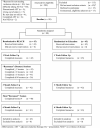Randomized Controlled Pilot Trial of a Low-Touch Remotely-Delivered Values Intervention to Promote Adherence to Adjuvant Endocrine Therapy Among Breast Cancer Survivors
- PMID: 35323853
- PMCID: PMC9345183
- DOI: 10.1093/abm/kaab118
Randomized Controlled Pilot Trial of a Low-Touch Remotely-Delivered Values Intervention to Promote Adherence to Adjuvant Endocrine Therapy Among Breast Cancer Survivors
Abstract
Background: Oral anti-cancer treatments such as adjuvant endocrine therapies (AET) for breast cancer survivors are commonly used but adherence is a challenge. Few low-touch, scalable interventions exist to increase ET adherence.
Purpose: To evaluate the acceptability, feasibility, and initial efficacy of a low-touch, remotely-delivered values plus AET education intervention (REACH) to promote AET adherence.
Methods: A mixed-methods trial randomized 88 breast cancer survivors 1:1 to REACH or Education alone. Wisepill real-time electronic adherence monitoring tracked monthly AET adherence during a 1-month baseline through 6-month follow-up (FU) (primary outcome). Patient-reported outcomes were evaluated through 3- and 6-month FU (secondary). Multiple indices of intervention feasibility and acceptability were evaluated. Qualitative exit interviews (n = 38) further assessed participants' perceptions of feasibility/acceptability and recommendations for intervention adaptation.
Results: The trial showed strong feasibility and acceptability, with an eligible-to-enrolled rate of 85%, 100% completion of the main intervention sessions, and "good" intervention satisfaction ratings on average. For Wisepill-assessed AET adherence, REACH outperformed Education for Month 1 of FU (p = .027) and not thereafter. Participants in REACH maintained high adherence until Month 4 of FU, whereas in Education, adherence declined significantly in Month 1. Conditions did not differ in self-reported adherence, positive affective attitudes, future intentions, or necessity beliefs. REACH trended toward less negative AET attitudes than Education at 3-month FU (p = .057) reflecting improvement in REACH (p = .004) but not Education (p = .809). Exploratory moderator analyses showed that average to highly positive baseline AET affective attitudes and oncologist-patient communication each predicted higher adherence following REACH than Education; low levels did not. Participants identified recommendations to strengthen the interventions.
Conclusions: REACH, a low-touch values intervention, showed good feasibility and acceptability, and initial promise in improving objectively-assessed AET adherence among breast cancer survivors (relative to education alone). Future research should target improving REACH's tailoring and endurance.
Keywords: Acceptance and commitment therapy; Adherence; Breast cancer; Endocrine therapy; Real-time adherence monitoring; Values.
© Society of Behavioral Medicine 2022. All rights reserved. For permissions, please e-mail: journals.permissions@oup.com.
Figures
References
-
- World Cancer Research Fund/American Institute for Cancer Research: Diet, Nutrition, Physical Activity and Breast Cancer. 2018, from dietandcancerreport.org
-
- Early Breast Cancer Trialists’ Collaborative Group: Effects of chemotherapy and hormonal therapy for early breast cancer on recurrence and 15-year survival: An overview of the randomised trials. Lancet. 2005;365:1687–1717. - PubMed



